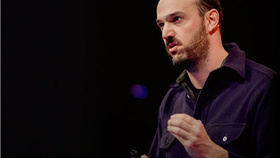I want to start by doing an experiment. I'm going to play three videos of a rainy day.
我想用一個實驗來開始我的演講。我將給你們播放三段雨天的視頻。
But I've replaced the audio of one of the videos, and instead of the sound of rain, I've added the sound of bacon frying.
不過我把其中一個視頻里的音頻換成了別的,它不再是下雨的聲音,變成了煎培根的聲音。
So I want you think carefully which one the clip with the bacon is.
我想讓你們認真聽,找出哪個視頻里是煎培根聲。
All right. Actually, I lied. They're all bacon.
好的。其實,我撒謊了。這些全都是煎培根的聲音。
My point here isn't really to make you hungry every time you see a rainy scene,
我的目的并不是讓你們每次看到下雨都覺得肚子餓,
but it's to show that our brains are conditioned to embrace the lies. We're not looking for accuracy.
而是想告訴你們我們的大腦習慣于接受這些假象。我們關注的并不是準確度。

So on the subject of deception, I wanted to quote one of my favorite authors.
在造假的這個主題里,我想引用我最喜歡的一位作家的話。
In "The Decay of Lying," Oscar Wilde establishes the idea that all bad art comes from copying nature and being realistic;
在“謊言的衰變”中,奧斯卡·王爾德有這樣的結論,所有糟糕的藝術都源于刻板的復制自然和現實;
and all great art comes from lying and deceiving, and telling beautiful, untrue things.
那些偉大的藝術都是依靠造假和騙術,敘說著美麗的、不真實的東西。
So when you're watching a movie and a phone rings, it's not actually ringing.
所以,當你在觀看電影時,電話鈴響了,那不是真正的電話鈴響。
It's been added later in postproduction in a studio.
都是在后期制作中加進去的。
All of the sounds you hear are fake. Everything, apart from the dialogue, is fake.
所有的聲音都是假的。除了那些對話,所有的聲音都是假的。











